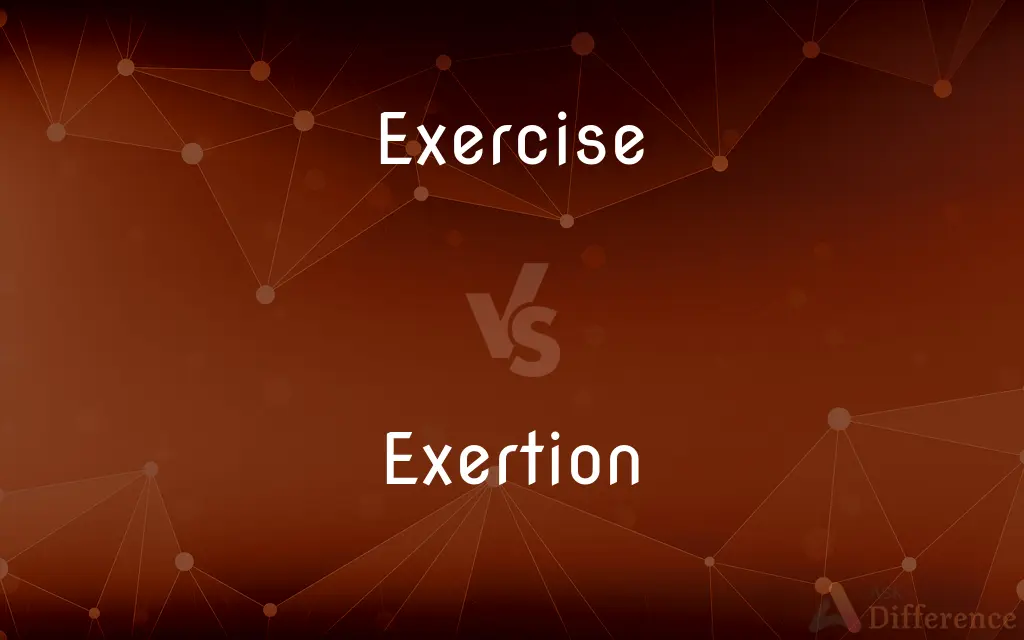Exercise vs. Exertion — What's the Difference?
By Urooj Arif & Maham Liaqat — Updated on April 1, 2024
Exercise is a structured physical activity aiming for fitness or specific training goals, while exertion is the physical or mental effort applied towards any task.

Difference Between Exercise and Exertion
Table of Contents
ADVERTISEMENT
Key Differences
Exercise is a planned, structured, and repetitive physical activity, designed to improve or maintain one physical fitness component, such as strength, flexibility, or cardiovascular health. Exertion, on the other hand, refers to the amount of physical or mental effort put into any activity, not necessarily structured or planned for fitness purposes.
While exercise is typically associated with physical well-being and is often performed to achieve health and fitness goals, exertion can occur in a variety of contexts, including work, daily tasks, or during exercise itself. The level of exertion can vary widely, from low to high intensity, depending on the task at hand.
Exercise activities are diverse, ranging from walking, running, and swimming to strength training and yoga. Each of these activities requires a certain level of exertion, but the exercise is distinguished by its purposeful nature towards enhancing physical fitness. Whereas exertion is a broader term that encompasses any effort, whether physical or mental, and does not imply a specific goal related to physical health or fitness.
An important distinction between exercise and exertion is the intention behind the activity. Exercise is undertaken with the intention of improving health, fitness, or performance. In contrast, exertion is simply the act of applying effort and can result from any activity, regardless of the end goal.
The measurement of exercise often involves parameters such as duration, frequency, and intensity specific to physical fitness goals, whereas exertion is measured more subjectively, often through perceived effort levels, regardless of the activity's nature.
ADVERTISEMENT
Comparison Chart
Definition
Structured physical activity for fitness or specific training goals.
Physical or mental effort applied towards any task.
Purpose
Improve or maintain physical fitness.
Apply effort, regardless of the goal.
Context
Physical well-being and fitness.
Any physical or mental task.
Measurement
Duration, frequency, intensity.
Perceived effort level.
Examples
Walking, running, swimming, yoga.
Working hard, carrying heavy loads, studying intensively.
Compare with Definitions
Exercise
Structured physical activity for health or performance.
She follows a strict exercise routine that includes running and yoga.
Exertion
Not limited to planned physical activities.
The mental exertion involved in solving complex problems can be tiring.
Exercise
Can be categorized into aerobic, strength, flexibility, and balance exercises.
Aerobic exercises like cycling are great for cardiovascular health.
Exertion
Can be subjective and difficult to measure precisely.
Perceived exertion rates help gauge workout intensity.
Exercise
Aimed at improving physical fitness components.
His exercise program focuses on strength training to build muscle.
Exertion
Occurs in a wide range of activities, not just exercise.
Daily activities like gardening or cleaning involve physical exertion.
Exercise
Involves planning and regularity.
She plans her exercise sessions for early mornings to ensure consistency.
Exertion
Any effort applied towards a task, whether physical or mental.
The exertion of moving boxes all day left him exhausted.
Exercise
Often involves specific equipment or settings.
The gym offers a variety of exercise equipment for all fitness levels.
Exertion
Varies in intensity, from low to high.
Even low levels of exertion can be beneficial for health.
Exercise
Exercise is any bodily activity that enhances or maintains physical fitness and overall health and wellness.It is performed for various reasons, to aid growth and improve strength, prevent aging, develop muscles and the cardiovascular system, hone athletic skills, weight loss or maintenance, improve health, or simply for enjoyment. Many individuals choose to exercise outdoors where they can congregate in groups, socialize, and enhance well-being.In terms of health benefits, the amount of recommended exercise depends upon the goal, the type of exercise, and the age of the person.
Exertion
Exertion is the physical or perceived use of energy. Exertion traditionally connotes a strenuous or costly effort, resulting in generation of force, initiation of motion, or in the performance of work.
Exercise
Activity requiring physical effort, carried out to sustain or improve health and fitness
Loosening-up exercises
Exercise improves your heart and lung power
Exertion
The act or an instance of exerting, especially a strenuous effort.
Exercise
An activity carried out for a specific purpose
An exercise in public relations
Exertion
An expenditure of physical or mental effort.
Exercise
The use or application of a faculty, right, or process
The exercise of authority
Exertion
The act of exerting, or putting into motion or action; the active exercise of any power or faculty; an effort, esp. a laborious or perceptible effort; as, an exertion of strength or power; an exertion of the limbs or of the mind; it is an exertion for him to move, to-day.
Exercise
Use or apply (a faculty, right, or process)
Control is exercised by the Board
Anyone receiving a suspect package should exercise extreme caution
Exertion
Use of physical or mental energy; hard work;
He got an A for effort
They managed only with great exertion
Exercise
Engage in physical activity to sustain or improve health and fitness
She still exercised every day
Exercise
Occupy the thoughts of; worry or perplex
Macdougall was greatly exercised about the exchange rate
Exercise
Activity that requires physical or mental exertion, especially when performed to develop or maintain fitness
Walks every day for exercise.
Exercise
A specific activity performed to develop or maintain fitness or a skill
Sit-ups and other exercises.
A piano exercise.
Exercise
The active use or application of something
The exercise of good judgment.
Exercise
The discharge of a duty, function, or office.
Exercise
An activity having a specified aspect
An undertaking that was an exercise in futility.
Exercise
A military maneuver or training activity.
Exercise
Exercises A ceremony that includes speeches, presentations, and other activities
Graduation exercises.
Exercise
To subject to practice or exertion in order to train, strengthen, or develop
Exercise the back muscles.
Exercise the memory.
Exercise
To put through exercises
Exercise a platoon.
Exercise
To make active use of; employ, apply, or exert
Exercise restraint.
Exercise control.
Exercise
To discharge (duties, for example).
Exercise
To carry out the functions of
Exercise the role of disciplinarian.
Exercise
To execute the terms of (a stock option, for example).
Exercise
To alarm, worry, or anger; upset
An injustice that exercised the whole community.
Exercise
To engage in exercise.
Exercise
(countable) Any activity designed to develop or hone a skill or ability.
The teacher told us that the next exercise is to write an essay.
Exercise
Activity intended to improve physical, or sometimes mental, strength and fitness.
Swimming is good exercise.
I like to do my exercises every morning before breakfast.
I do crosswords for mental exercise.
Exercise
A setting in action or practicing; employment in the proper mode of activity; exertion; application; use.
The law guarantees us the free exercise of our rights.
Exercise
The performance of an office, ceremony, or duty.
I assisted the ailing vicar in the exercise of his parish duties.
Exercise
(obsolete) That which gives practice; a trial; a test.
Exercise
To exert for the sake of training or improvement; to practice in order to develop.
To exercise troops or horses;
To exercise one's brain with a puzzle
Exercise
(intransitive) To perform physical activity for health or training.
I exercise at the gym every day.
Exercise
(transitive) To use (a right, an option, etc.); to put into practice.
The tenant exercised his option to renew the tenancy.
She is going to exercise her right to vote.
Exercise
To occupy the attention and effort of; to task; to tax, especially in a painful or vexatious manner; harass; to vex; to worry or make anxious.
Exercised with pain
Exercise
(obsolete) To set in action; to cause to act, move, or make exertion; to give employment to.
Exercise
The act of exercising; a setting in action or practicing; employment in the proper mode of activity; exertion; application; use; habitual activity; occupation, in general; practice.
Exercise of the important function confided by the constitution to the legislature.
O we will walk this world,Yoked in all exercise of noble end.
Exercise
Exertion for the sake of training or improvement whether physical, intellectual, or moral; practice to acquire skill, knowledge, virtue, perfectness, grace, etc.
An exercise of the eyes and memory.
Exercise
Bodily exertion for the sake of keeping the organs and functions in a healthy state; hygienic activity; as, to take exercise on horseback; to exercise on a treadmill or in a gym.
The wise for cure on exercise depend.
Exercise
The performance of an office, a ceremony, or a religious duty.
Lewis refused even those of the church of England . . . the public exercise of their religion.
To draw him from his holy exercise.
Exercise
That which is done for the sake of exercising, practicing, training, or promoting skill, health, mental, improvement, moral discipline, etc.; that which is assigned or prescribed for such ends; hence, a disquisition; a lesson; a task; as, military or naval exercises; musical exercises; an exercise in composition; arithmetic exercises.
The clumsy exercises of the European tourney.
He seems to have taken a degree, and performed public exercises in Cambridge, in 1565.
Exercise
That which gives practice; a trial; a test.
Patience is more oft the exerciseOf saints, the trial of their fortitude.
Exercise
To set in action; to cause to act, move, or make exertion; to give employment to; to put in action habitually or constantly; to school or train; to exert repeatedly; to busy.
Herein do I Exercise myself, to have always a conscience void of offence.
Exercise
To exert for the sake of training or improvement; to practice in order to develop; hence, also, to improve by practice; to discipline, and to use or to for the purpose of training; as, to exercise arms; to exercise one's self in music; to exercise troops.
About him exercised heroic gamesThe unarmed youth.
Exercise
To occupy the attention and effort of; to task; to tax, especially in a painful or vexatious manner; harass; to vex; to worry or make anxious; to affect; to discipline; as, exercised with pain.
Where pain of unextinguishable fireMust exercise us without hope of end.
Exercise
To put in practice; to carry out in action; to perform the duties of; to use; to employ; to practice; as, to exercise authority; to exercise an office.
I am the Lord which exercise loving-kindness, judgment, and righteousness in the earth.
The people of the land have used oppression and exercised robbery.
Exercise
To exercise one's self, as under military training; to drill; to take exercise; to use action or exertion; to practice gymnastics; as, to exercise for health or amusement.
I wear my trusty sword,When I do exercise.
Exercise
The activity of exerting your muscles in various ways to keep fit;
The doctor recommended regular exercise
He did some exercising
The physical exertion required by his work kept him fit
Exercise
The act of using;
He warned against the use of narcotic drugs
Skilled in the utilization of computers
Exercise
Systematic training by multiple repetitions;
Practice makes perfect
Exercise
A task performed or problem solved in order to develop skill or understanding;
You must work the examples at the end of each chapter in the textbook
Exercise
(usually plural) a ceremony that involves processions and speeches;
Academic exercises
Exercise
Put to use;
Exert one's power or influence
Exercise
Carry out or practice; as of jobs and professions;
Practice law
Exercise
Give a work-out to;
Some parents exercise their infants
My personal trainer works me hard
Work one's muscles
Exercise
Do physical exercise;
She works out in the gym every day
Exercise
Learn by repetition;
We drilled French verbs every day
Pianists practice scales
Common Curiosities
What defines exercise?
Exercise is planned, structured physical activity aimed at improving or maintaining physical fitness.
Can exertion occur without exercising?
Yes, exertion can occur in many activities not aimed at fitness, like manual labor, stressful work, or intense study.
Why is exercise important?
Exercise is crucial for maintaining physical health, enhancing fitness levels, and preventing diseases.
What are some common forms of exercise?
Walking, running, swimming, cycling, and strength training are common forms of exercise.
How can one measure exertion?
Exertion is often measured subjectively, for instance, through the perceived effort level or the Borg Scale of perceived exertion.
How does exertion contribute to health?
While exertion through exercise improves physical health, any form of exertion, including mental, can contribute to overall well-being by challenging the body or mind.
Is it possible to overexert oneself during exercise?
Yes, overexertion during exercise can lead to injuries or health issues, highlighting the need for moderated, well-planned physical activities.
How do professionals measure exercise intensity?
Professionals often use heart rate, oxygen consumption, and perceived exertion scales to measure exercise intensity.
What role does exertion play in weight loss?
Physical exertion through exercise increases calorie burn, contributing to weight loss and body composition changes.
What is a fitness goal related to exercise?
Fitness goals can include increasing strength, improving cardiovascular health, enhancing flexibility, or losing weight.
How is exertion different from exercise?
Exertion refers to the physical or mental effort expended on any activity, not just structured physical fitness activities.
How should one balance exercise and exertion?
Balancing exercise and exertion involves listening to one's body, ensuring adequate rest, and avoiding overexertion to prevent injury.
Can mental activities involve exertion?
Yes, mental activities can involve significant exertion, as in the case of solving complex problems or studying intensively.
Is all physical activity considered exercise?
Not all physical activities are considered exercise; exercise is specifically aimed at improving fitness and involves regular, structured activities.
Can exertion be both positive and negative?
Yes, while exertion can lead to positive health outcomes, excessive or inappropriate exertion can result in negative health effects.
Share Your Discovery

Previous Comparison
Nonmetric vs. Metric
Next Comparison
Polymer vs. TrimerAuthor Spotlight
Written by
Urooj ArifUrooj is a skilled content writer at Ask Difference, known for her exceptional ability to simplify complex topics into engaging and informative content. With a passion for research and a flair for clear, concise writing, she consistently delivers articles that resonate with our diverse audience.
Co-written by
Maham Liaqat















































